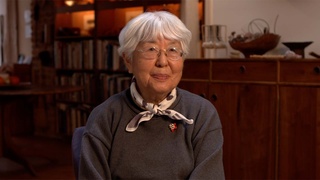Interviews
Hearing anti-American war propaganda from a teacher
And another time, I think when things were really getting worse, he, another one I remember so vividly is the one he said -- well, of course, the Japanese navy was so popular and strong. So he would say, well, when they look over the Pacific, the dark-eyed Japanese, the eyeballs are brown, and so they can absorb the light much more than the blue, light blue eyes and so they can see so much more over the Pacific. And he said, The Amerikajins (Americans) are kinpatsu (blond hair), you know, the golden hair and the blue eyes and they're blinded by the sun so they can't see far away. And so, you see the advantage we have.
And here, inside, you keep asking me how I felt. I thought, How stupid. And I couldn't even tell any of my friends this. So it's a very private thought that I thought. How sad. Does he expect people to believe that? I mean, I certainly didn't believe it. I knew enough science or whatever to -- that it just -- you know, something that I just personally could not accept. And I thought, gee, how ugly this must be, truly a desperate wartime situation.
Date: August 3 & 4, 2003
Location: Washington, US
Interviewer: Alice Ito
Contributed by: Denshō: The Japanese American Legacy Project.
Explore More Videos

The Dopey bank that survived the war
(b. 1934) Award-winning Disney animation artist who was incarcerated at Topaz during WWII

Evacuated to the Jungle
(b. 1938) Philipines-born hikiagesha who later migrated to the United States.

Captured by Guerillas after bombing of Pearl Harbor
(b. 1938) Philipines-born hikiagesha who later migrated to the United States.

Grandfather picked up by US Army
(b. 1952) Former banking executive, born in Hawaii

Father's business partner operated their farming business during WWII
(b. 1935) Sansei businessman.

Father was convinced the constitution would protect him
(b. 1935) Sansei businessman.


Working together in Okinawa using three languages
Okinawan American whose parents are from Peru.

The lack of discussion about family’s incarceration in Amache
Sansei judge for the Superior Court of Los Angeles County in California


Being Confused about Racial Identity in Postwar United States
(b. 1932) Nisei American stage, film, and TV actress

Her brother’s reasons as a No-No Boy
(b. 1923) Japanese American poet, activist

Her grandfather was pressured to teach Japanese
Sansei judge on the Superior Court of Los Angeles County in California

Neighbor took care of her mother after grandfather was taken by FBI
Sansei judge on the Superior Court of Los Angeles County in California

Immediately after the bombing
(b. 1938) Japanese American. Hiroshima atomic bomb survivor
